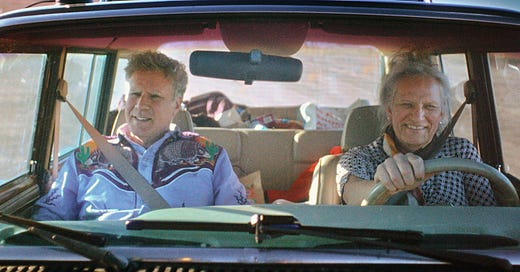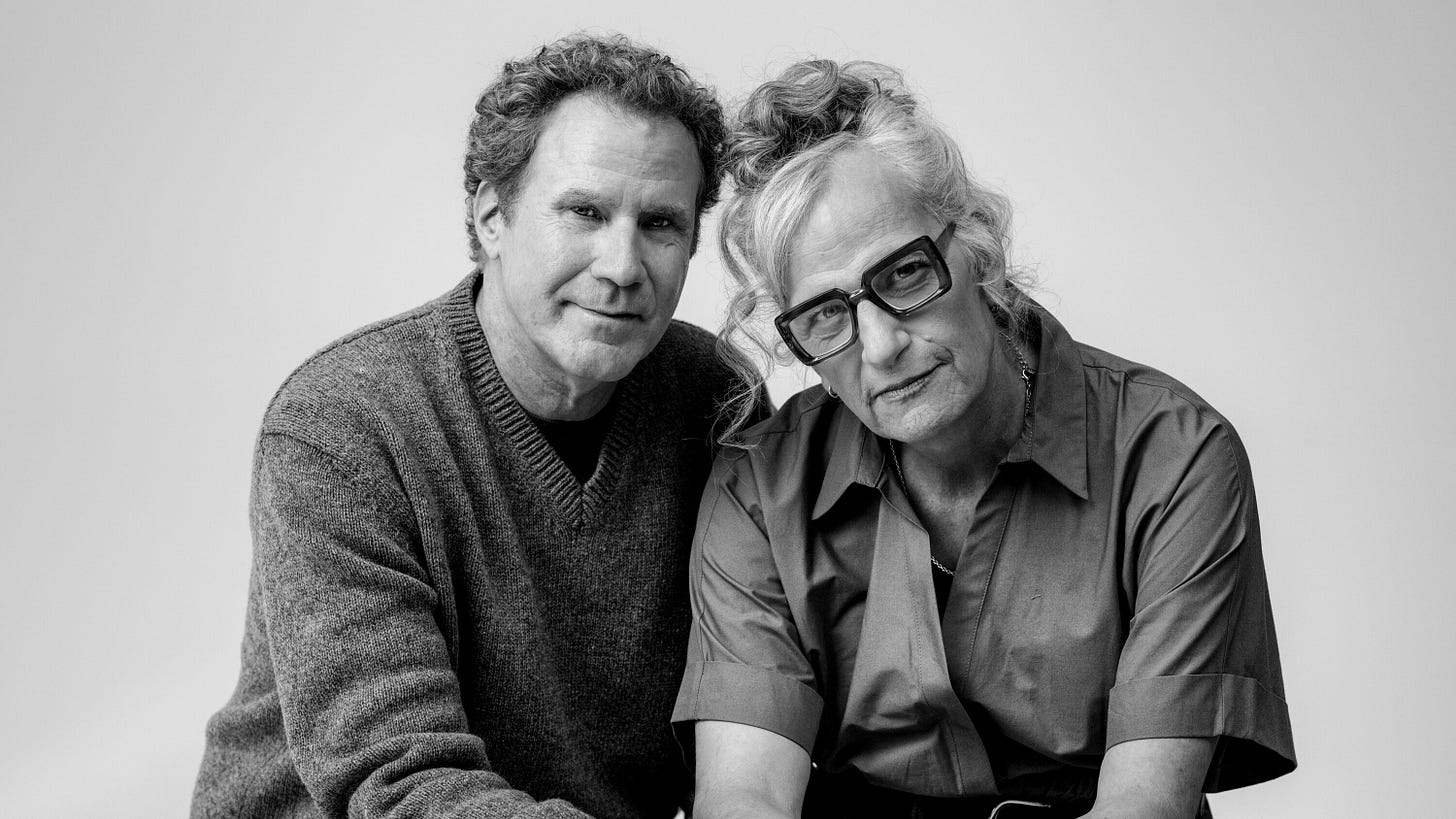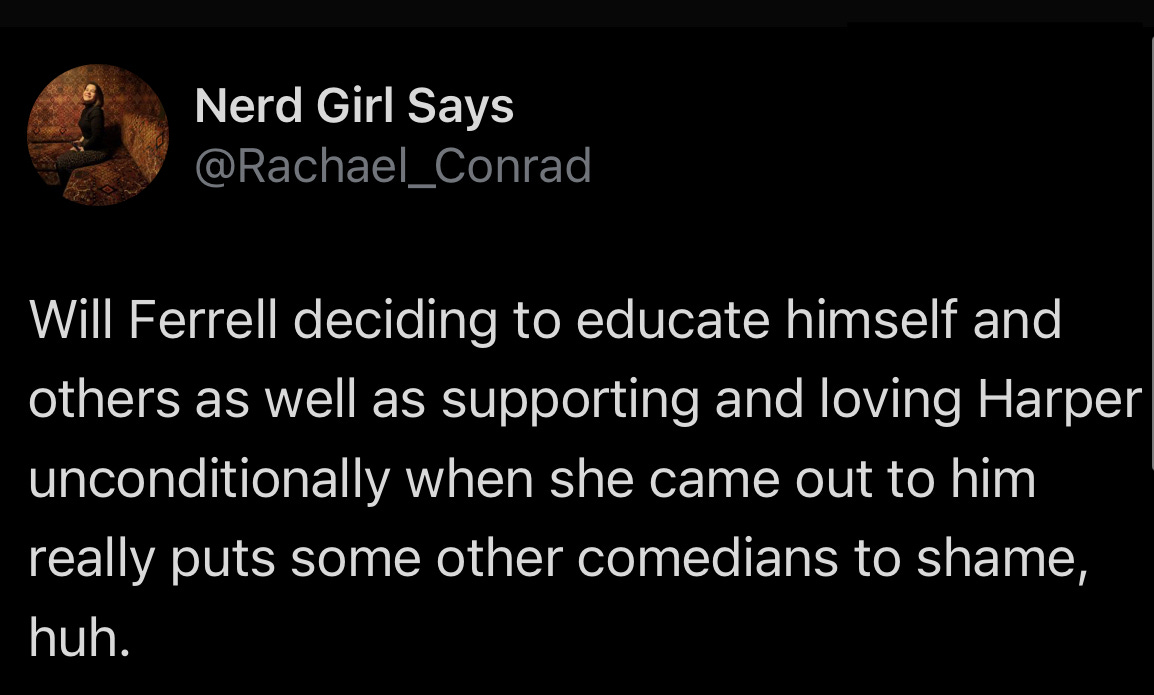Will Ferrell, Harper Steele and Art's Role In Creating Social Change
“Often the best way to get people to listen is to give them laughter first, and then introduce what you want to say.” — Josh Greenbuam
Believe me, I wanted to write about Lee Daniels’s The Deliverance — and I think inevitably I will in the coming weeks — but after seeing the trailer for Netflix’s Will & Harper, I felt compelled to reroute.
The documentary film, which will arrive on Netflix on September 27 and dropped its trailer last week, features Will Ferrell (who’s quietly had a side-hustle as a producer of films like Booksmart, Hustlers, Barb and Star Go to Vista Del Mar, Theater Camp and May December) alongside his friend and former co-worker, Harper Steele, as they embark on a 17-day road trip across the United States. The hook? In the time since they met at Saturday Night Live (where Steele served as a head writer throughout Ferrell’s first four years) and became friends, Steele has come out as transgender.
“What if we went on a road trip together, giving her a chance to go into a cowboy bar or whatever places she misses, and I can be by her side and lend support as a friend?” Ferrell suggested when first pitching the film.
“At the same time, it would give us a chance to reconnect, and figure out what this transition means to our relationship.”
For Steele, it was about fortifying her relationship with her old friend, but also rediscovering the sense of safety she’d taken for granted when presenting to the world as a man. Steele explained:
“I didn’t just want to come out in places like New York or LA and forever live on either coast. I love the whole country. It’s my country, and I wanted to feel a little safer being in it. And I thought that going across the country with Will Ferrell would help me. That’s the privilege I have, knowing Will Ferrell.”
I was particularly drawn to a quote from Will & Harper director Josh Greenbaum, who also, not coincidentally, directed Barb and Star. “Laughter is the shortest distance between two people,” he remarked.
“I’m a huge believer in this expression. As a filmmaker, that’s how I try to connect with people. Comedy is my medium to say something about the world, because often the best way to get people to listen is to give them laughter first, and then introduce what you want to say. It’s not that I find this a novel concept, but I think it’s an important framework by which to understand this film, both in intention and execution.”
There’s a number of striking moments in the film’s trailer, like Ferrell describing what it was like to receive an email from Harper declaring that she’ll be transitioning to live as a woman. “It was just… whoa,” Ferrell tells the camera, expressing in a single word a reaction that wasn’t judgemental or bigoted, but recognized the shock any friend might feel upon learning news that upends their preconception of a person they hold dear. Worried. Nervous. Weird. These are some of the feelings expressed in the film. Later, we see the pair at an auto racing show. “I used to come out to these places before and then I transitioned and I got a little afraid, you know what I’m saying,” Harper tells a group of men there. “If you enjoy it, come,” one responds. And then there’s Steele’s admission that she’s not afraid of hating “these people,” but rather of hating herself.
Critics are praising it (“a resoundingly joyful and moving documentary, resplendent in its openness,” “emotional, funny, and charged with a sense of vulnerability,” “a generous, sensitive study of allyship”); see this tweet with more “likes” than the trailer itself:
One particularly provoking bite came (unsurprisingly) from Richard Lawson’s Sundance dispatch back in January for Vanity Fair, in which he wrote:
“The film’s greatest strength is the way it grants access to a topic many are deliberately ignorant about.”
I want to zero in on the medium, too. We’ve had many instances of celebrities embracing, celebrating and educating about their experiences with loving trans family members. Dwyane Wade comes to mind. “She’s the strong one in this family, she’s the hero,” he once said of his teen daughter Zaya, who came out publicly as trans in 2020. Wade has gone above and beyond in not just advocating for his daughter, but using the education brought on by her coming out as a catalyst to help other trans youth. He’s subsequently called out anti-LGBT+ lawmakers and launched a nonprofit online community dedicated to supporting transgender youth.
There’s also Marlon Wayans, who spoke on The Breakfast Club about his support of his son, Kai. "Not her, his, their transition, but my transition as a parent going from ignorance and denial to complete unconditional love and acceptance," he said, adding, "I think there's a lot of parents out there that need to have that message." And Jamie Lee Curtis, who told Morning Joe:
“This is my daughter, this human being has come to me and said, 'This is who I am.' And my job is to say, 'Welcome home.' I will fight and defend her right to exist to anyone who claims that she doesn't."
And Sade, who recently dedicated her first new song in six years to her son, Izaak. “Thank you for fighting with me to complete the man I am,” he once wrote on Instagram with a photo of him cuddled up with his mother. “Thank you for your encouragement when things are hard, for the love you give me. The purest heart.”
These are significant moments for sure, but to some might only hold the level of significance of a celebrity speaking out about politics. I’d put Will & Harper in the same category as Wade’s Netflix documentary short, Fathers, which is centered around fathers’ love for their trans children. It’s a terrific film that suffered only from a lack of visibility. It also had a more clinical approach to its storytelling that for some might seem more preachy than eye-opening. Will & Harper has the advantage of a figure like Ferrell, who’s both incredibly famous and not known for on-screen sincerity. In that sense, he does not strike you as the kind of guy to make a film like this. But also, as evidenced in the trailer, this is not some entirely saccharine film. Ferrell is, after all, a comedian, as is Steele, and so their humor as both individuals and as a collective make this new ground feel at once like familiar territory.
There’s another key difference: Whereas Wade has had a public journey with his daughter’s coming out, Ferrell’s experience might be one far more people have proximity to in spotlighting what it does to a person when they have to unlearn ideas that they long held true about someone close to them. While acceptance is the baseline, navigating the often bumpy journey toward that can be incredibly enriching, especially approaching it through the prism of friendship vs. family. Familial bonds are strong, but the bonds of friendship (or as some call them, “chosen family”) often hold more significant weight because of the choice to hold them close not being born out of circumstance.
I’ve seen some online asking the question “Can this film save lives?” A cynical answer might be an immediate “no,” while a quixotic one might reason “of course.” For me, I’d position this akin to Peter Pan’s “I do believe in fairies” in opting to choose to believe in the power of a film like this. I recognize the platform’s reach, the storyteller’s reach and a framework that feels fresh. I think being honest about the discomfort and growing pains human beings feel when faced with change of any kind is important to spotlight. We’ve grown accustomed to shaming people for their belief systems rather than attempting to understand where those belief systems are born from and, more importantly, if they can be unlearned.
I haven’t seen the film yet. Maybe it won’t hit for me. Maybe it will change my life. Can’t know for certain until I see it. But I have high hopes for this film reaching an audience of people who might not be receptive to the film’s message if it were brought forward in any other medium. And I think that alone is a powerful thing — and one that should not be dismissed.








